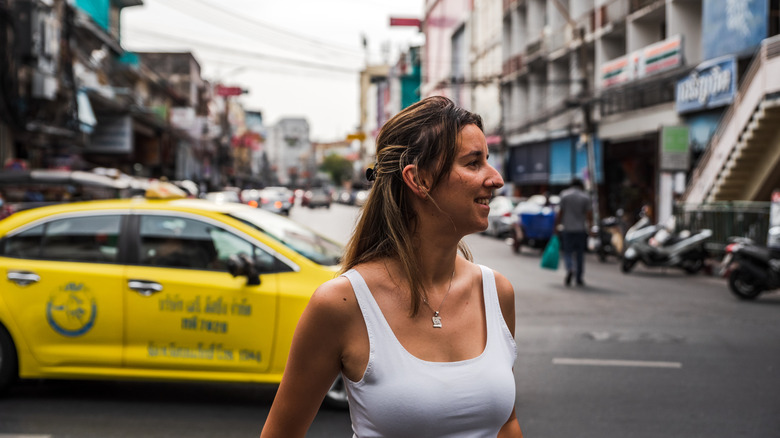
You may be an expert when it comes to packing for a trip to Europe, but planning what to bring on a trip to a developing country is a whole other ballgame. Traveling to developing countries is an enriching
experience that offers a glimpse into another culture and way of life — and with that comes confronting the differences in the comforts and conveniences that you're accustomed to. As a result, you'll need to carefully consider what you pack for the journey.
One of the biggest adjustments travelers face when visiting a developing country is availability. Certain items or products easily available in certain countries can be harder to obtain in others. And if you come across them, chances are you'll be bowled over by their hefty price tags. Similarly, a developing country's tourism infrastructure may be limited: Internet could be spotty, hospitals that speak English might be few or far away, and electricity may not be completely reliable. The key? Preparation. Strategic packing will allow you to focus on your trip instead of worrying about the small stuff. If you decide to leave the crowds behind by traveling to some of the world's least-visited countries, these are the essential items that should make it to your packing list.
Read more: The Most Tourist-Friendly Countries In The World, According To Travelers
Medicine And First-Aid Items
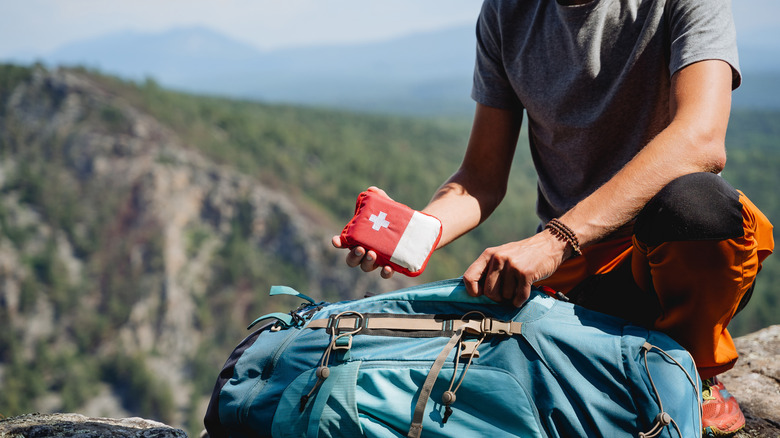
It goes without saying that a good medical or travel insurance is indispensable, but should you come across a medical hiccup during your trip, having the most basic medication on hand is a huge comfort. Pain relievers and fever pills like ibuprofen, aspirin, or acetaminophen should be in everyone's medical kit. They help with periods of malaise and discomfort, offering you instant relief or tiding you over until you get further medical attention. Motion sickness tablets also come in handy for bumpy roads or choppy seas.
Sampling the local cuisine is one of the greatest ways of discovering a country, especially if you happen to be in a destination with an affordable and adventurous street food scene. But if certain foods don't sit well with your stomach, it's good practice to have medicine to combat indigestion, diarrhea, nausea, or upset stomach like Tums or Pepto Bismol in your medical kit. Electrolyte solutions or oral rehydration salts can speed up your recovery after a bout of dehydration or diarrhea. In destinations where access to clean water is limited, avoid any waterborne viruses by using water purification tablets if you can't get bottled water. Additionally, pack some vitamin supplements or iron pills, anti-malarial pills, antiseptic cream, and antihistamines.
Finally, prepare a first-aid kit with a thermometer, gauze, bandages, alcohol swabs, antibiotic ointment, antibacterial wipes, and hand sanitizer. Take any medical prescriptions along with you in case you need to buy medicines on site. As for mosquito repellant, it's generally recommended to buy locally, as a local formula may work best for mosquitos in your destination.
Toiletries And Hygiene Products
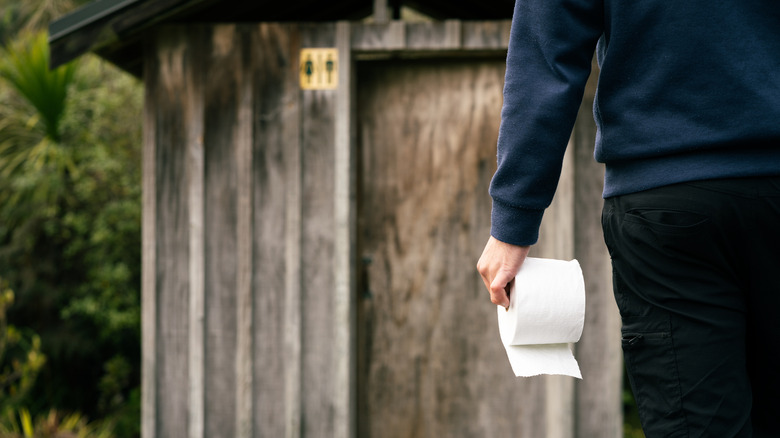
Certain countries have different sanitation practices and standards, so expect to encounter basic facilities like squat toilets. For camping, desert, or island adventures, bringing along rolls of toilet paper and wet wipes can prevent any bad surprises; keep the paper dry by placing it in Ziploc bags. To maintain good hygiene, prepare a toiletry kit with travel-sized shampoo, body soap, toothpaste, deodorant, and lotion to tide you over for a few days at your destination until you get your bearings and figure out where to stock up from local stores. Some Q-tips, cotton balls, and face and body wipes help keep you feeling refreshed when you don't immediately have access to a bathroom or running water. And bring some laundry sheets with you if you're planning on handwashing clothes throughout the duration of your travel — they're convenient and take up minimal space.
Be prepared for limited options on feminine hygiene products in developing countries, too. In some countries, you may only find pads, for example, so it's best to bring along your own tampons, menstrual cup, and other must-have toiletries.
Clothes For Convenience, Not For Style
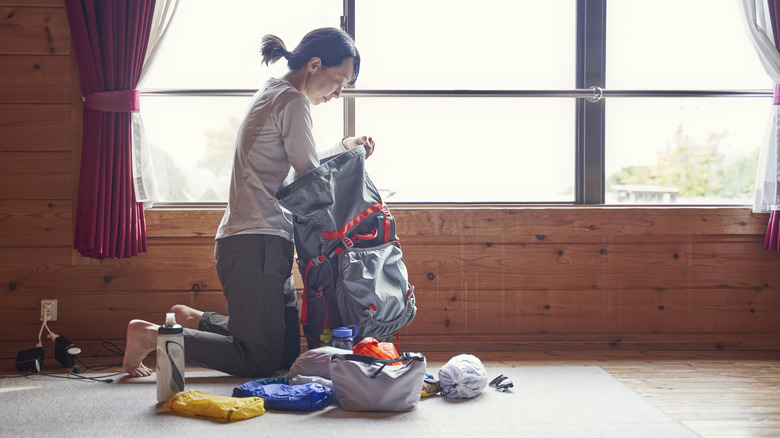
The weather in the country you're heading to will help dictate the crucial clothing items to pack. If you're heading to tropical climate countries, bring clothes that are breathable and made from moisture-wicking materials; they're quick to dry and keep your clothes from sticking to your body during unbearable heat. Thermals, beanies, a good jacket, and gloves are your best bets when visiting colder climate destinations where proper heating or insulation may be lacking. A pair of sturdy, all-terrain shoes is essential — and an article of clothing that's worth splurging on — especially if you're anticipating rough treks or temperamental weather. Aside from being a common footwear choice for warmer climate countries, a pair of rubber slippers is indispensable for bathrooms where sanitation standards are poorly maintained, helping you sidestep possible fungal infections.
Pashminas, scarves, or sarongs are useful items to have in your pack, especially when visiting more conservative countries. They can be slung around your shoulders, wrapped around your waist, or be worn as a covering around your head when entering temples, churches, shrines, or other sacred places. Their versatility in travel also knows no bounds, and these fabric accessories can even be used as a towel or blanket in a pinch.
Items For Safety And Convenience
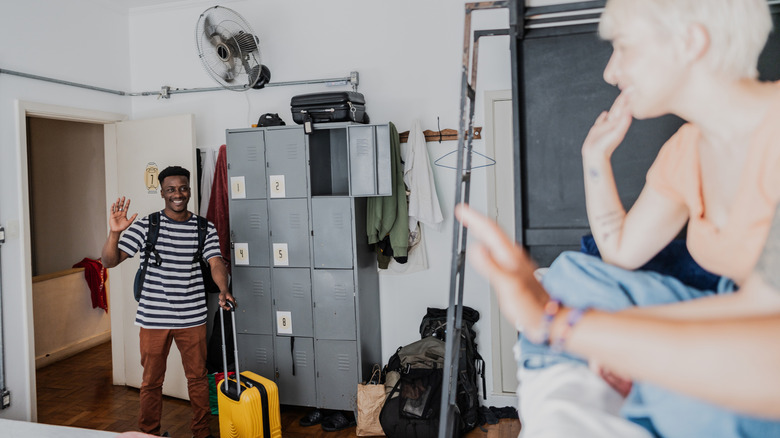
Security can be an issue in certain developing countries, so a little preparedness goes a long way. Take the extra step of bringing along a rubber doorstop, which can be wedged under the door of your accommodation. If you're staying in a hostel that provides lockers or an Airbnb with a safe box, take along a lock to prevent your belongings from theft (favor combination locks to key locks).
A basic sewing kit can save you from any clothing emergency, while having zip ties on hand can replace broken shoelaces and function as a temporary bag lock in a pinch. Meanwhile, a roll of gaffer tape can come in handy when you need to repair a broken sole, hold up a falling mosquito net, or run into a variety of other minor emergencies. Ziploc bags or plastic bags of varying sizes can also be used to waterproof travel documents and sensitive gadgets, as well as hold dirty clothes and shoes until the next laundry cycle. Finally, always bring along a paper copy of your passport, visas, health insurance certificates, immunization cards, spare passport photos, and other forms of identification as a backup in case of loss or theft.
Practical, Multi-Purpose Gadgets And Tech
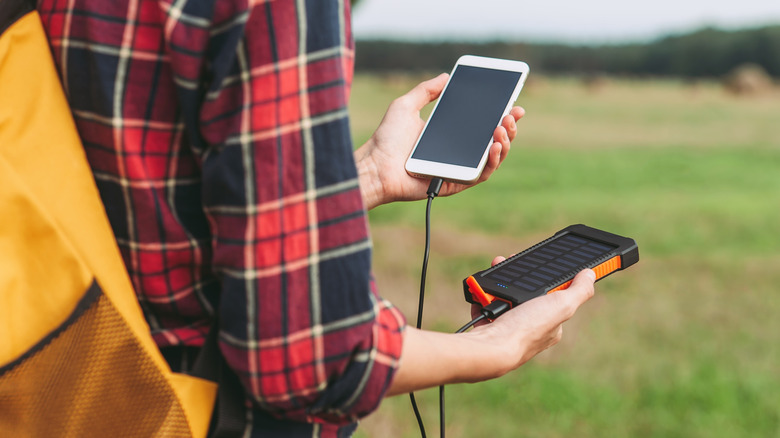
If you're visiting a country where power failures are a regular occurrence or internet and phone signals are an afterthought, having backup solutions for your gadgets can keep you connected to friends and family in case of emergencies. Gear up with universal power adapters and the necessary power cords you'll need for charging your phone or gadgets to power outlets. If you're heading to a remote area or a country prone to power outages like India or Nepal, have a fully charged power bank ready. To be extra prepared, a solar-powered charger can work wonders as well. Redditor u/theikno shared a solar-powered charger anecdote during a Zimbabwe trip: "Went there with an NGO to a village without electricity or running water and a friend brought one of those. She just charged it during the day in the middle of the construction site and picked it up before it got dark. Then charged her phone at night. Worked like a charm."
For safety purposes, though, bringing a minimal number of gadgets can free you of the worry of having these precious items misplaced or stolen. Use your smartphone's camera instead of lugging around heavy cameras and lenses, for example. That said, there are some instances when you should consider packing a second phone to ensure you stay connected.
Ready to discover more hidden gems and expert travel tips? Subscribe to our free newsletter for access to the world's best-kept travel secrets.
Read the original article on Islands.










